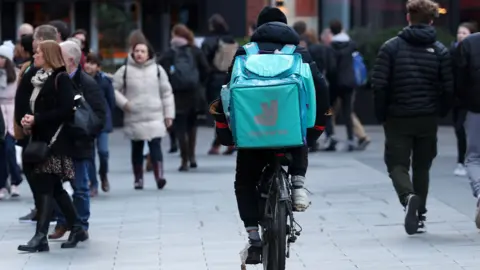**Title: Sharing Asylum Hotel Data with Food Delivery Firms: Home Office Initiative**
On July 23, 2025, the UK Home Office announced a significant policy change that will see the sharing of data regarding hotel locations housing asylum seekers with food delivery companies. This initiative is part of a broader crackdown on illegal employment practices, with an emphasis on preventing unauthorized work among migrants residing in these hotels.
Under this new agreement, leading food delivery platforms such as Deliveroo, Just Eat, and Uber Eats will gain access to specifics about the whereabouts of hotels accommodating asylum seekers. The rationale behind this move is to enable these companies to detect patterns of activity that might suggest illegal work, for example, delivery accounts frequently located around these asylum hotels. This approach aims to discourage the practice of delivery riders sharing their accounts with migrants lacking the legal right to work in the UK.
It is important to note that asylum seekers are prohibited from accepting employment for the first year following their arrival in the UK or until they receive approval for their asylum application. Thus, the Home Office’s measures are primarily aimed at ensuring compliance with these existing restrictions, and they hope to enhance enforcement against illegal working practices.
Despite these intentions, there are raised concerns about the existing instances where some asylum seekers in hotels have been reported to be generating income through food delivery apps. To counter this, last month, the involved delivery companies committed to implementing stricter identity checks for their riders to verify their legal eligibility to work within the country. These actions have reportedly resulted in thousands of individuals being removed from these platforms, and the Home Office anticipates that the latest data sharing initiative will further increase enforcement efforts.
Home Secretary Yvette Cooper reinforced the significance of this initiative, stating, “Illegal working undermines honest business, exploits vulnerable individuals, and fuels organized immigration crime.” She emphasized that enhancing data sharing with these delivery services is a proactive step towards closing loopholes and tightening enforcement against illegal activities.
In conjunction with this new strategy, the UK government has unveiled broader sanctions aimed at curbing illegal migration flows into the country. This includes listing 25 specific individuals and entities targeted as part of the crackdown, such as a supplier of small boats based in Asia and gang leaders operating in regions like the Balkans and North Africa. This list comprises various actors involved in employing fraudulent means to enable illegal entry into the country, including those responsible for supplying counterfeit passports and facilitating illicit financial transactions.
Alongside these developments, Foreign Secretary David Lammy heralded the sanctions as a “landmark moment” in the fight against organized crime, emphasizing the commitment of the UK authorities to hold these criminal networks accountable for their actions. In his statement, Lammy warned those who profit from exploiting vulnerable individuals, asserting that the government is aware of their identities and will work collaboratively with global partners to enforce justice.
Nonetheless, experts, including Dr. Madeleine Sumption, director of the Migration Observatory at Oxford University, have expressed skepticism regarding the efficacy of these sanctions. Sumption articulated her belief that significant change might not necessarily follow, stating that targeting individuals within expansive networks may result in limited impact. She articulated her thoughts on BBC Radio 4’s “Today” program, sharing her perspective that while the sanctions could create some disruption, they are unlikely to serve as a substantial deterrent against the ongoing issue of small boat crossings.
In conclusion, the efforts by the Home Office to collaborate with food delivery firms aim to curtail illegal working among asylum seekers, while the broader sanctions illustrate the government’s determination to tackle the complex phenomenon of illegal migration. However, the real impact of these measures remains to be seen, as experts continue to analyze their potential effectiveness in achieving meaningful change.











